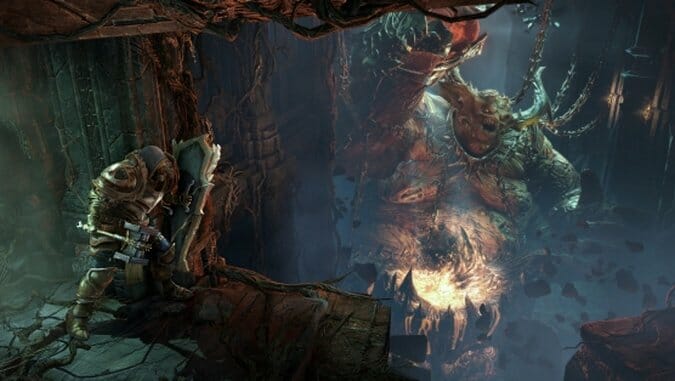Lords of the Fallen: Soulless Purpose

Describing Lords of the Fallen to someone sounds an awful lot like going through a list of Dark Souls patch notes that never were. An experience multiplier increases with every kill but resets when using a checkpoint; each corpse run now gives less experience back the longer you take; checkpoints won’t completely refill precious health potions, and the more you use a single checkpoint, the less useful it becomes; enemies only respawn when after you die, which makes it harder to grind areas and level up, but easier to make progress.
I hate to make evaluations by way of comparison, but when inspiration is as obvious as it is here, it’s the far more effective and interesting conversation to have. Dark Souls looms over any conversation about Lords, and to ignore that would be disingenuous. So.
Like many copycat products, Lords wants to expand the reach of its inspiration in all directions, to try to pull in as many people as possible. As a result, the whole experiences feels diluted. It’s unsure of what it really wants because it wants to be something for everyone. The changes I mentioned earlier should appeal to diehards, but Lords also eases newcomers in by wrapping an intimidating experience in several familiar wrappers. Loot is marked and colored a la Diablo, a triumphant horn marking the acquisition of rare gear; the simplified magic system takes more cues from an action game than Souls’ array of Sorceries, Miracles and Pyromancies. It looks friendlier, too: the aesthetic screams “evil” and “demonic” in the same non-threatening way games like Darksiders do.
The more important issue, however, is that these minor tweaks miss the point. At the core of Dark Souls was an oppressive indifference to your whims that brought every aspect of the game together. If you wanted to piece together a narrative through item descriptions and the few cut-scenes that weren’t boss introductions, you could, but Dark Souls didn’t care. The first few enemies of the game can destroy you, and there’s no difficulty setting to change that. You could wander around aimlessly in the wrong direction for hours, thinking that the game was harder than it really was because you thought to enter the Catacombs before heading to the Undead Burg. Though its world was clearly designed with the player in mind, I always felt like I was a cog in a machine that didn’t care if I lived or died.
Lords of the Fallen cares. It has copious cut-scenes. Dialogue options with the six or so other characters in the game (the ones who aren’t instinctively murderous, anyway). Audio diaries to give a better sense of what’s was going on in the world and your place within it, even if none of it is ultimately of interest. It has various tooltips on how to play, what classes should focus on doing what, and other miscellany on how to wade through the world it tries to present as desolate and harsh. You can’t get lost, because your objective is on-screen constantly. I made it a point to search for as many hidden areas as I could, but the world feels almost claustrophobic in size—not once did I have more than one path to follow, only one or two side quests to accomplish on my way to my goal.
This sort of heavy-handed approach seems almost patronizing to those who may have no clue what they were doing in Dark Souls, and I constantly wished the game would leave me alone to bash some skulls in like the sociopath I am. But with so little to do and this much guidance, nothing about this world feels desolate, lonely or harsh. That’s fine, I suppose—one of the biggest hurdles for people attempting to get into a game like Dark Souls is that just about everything is too obtuse, and its world feels too lonely. It’s an admirable goal, and Lords makes some good headway in that regard.
